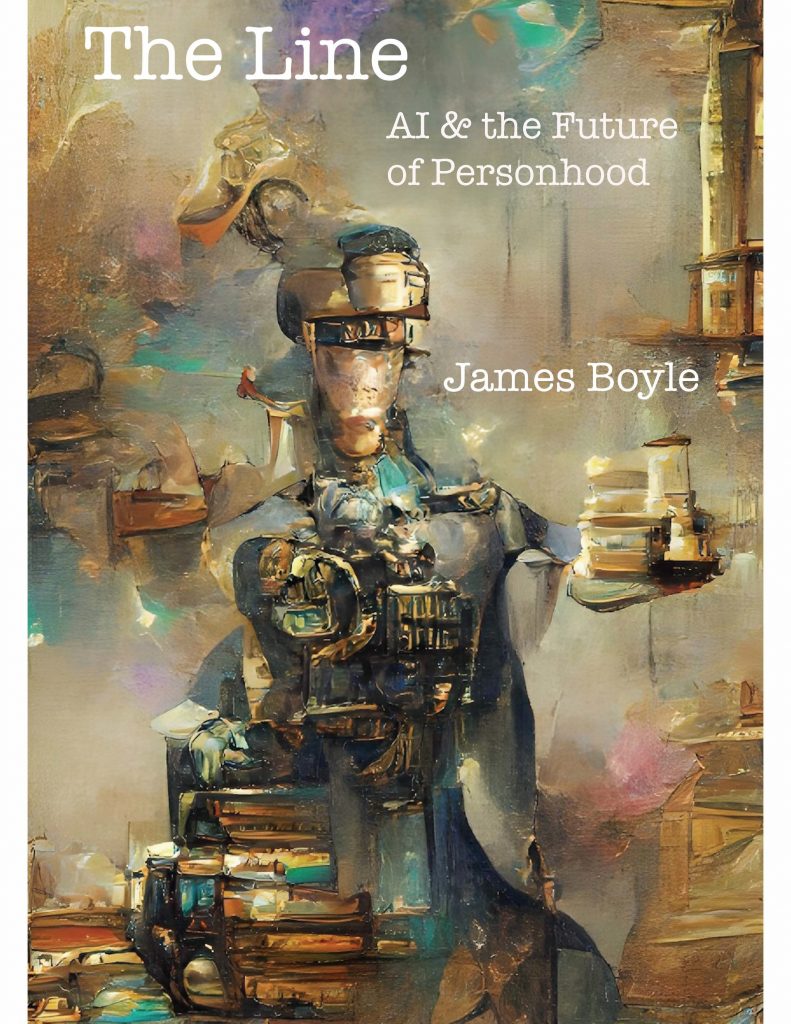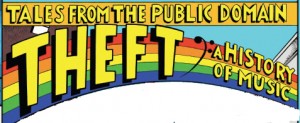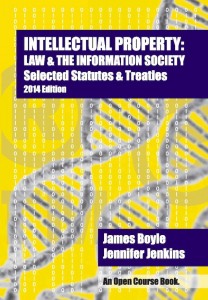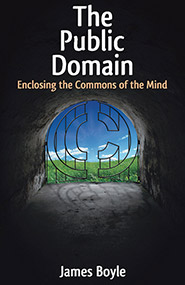Jennifer Jenkins and I have just published the 2021 edition of our free, Creative Commons licensed, Intellectual Property textbook.
Open Intellectual Property Casebook
by James Boyle & Jennifer Jenkins
Free Download 8”x10” Paperback Edition: $35.00
 This free textbook is an introduction to intellectual property law, the set of private legal rights that allows individuals and corporations to control intangible creations and marks—from logos to novels to drug formulæ—and the exceptions and limitations that define those rights. It focuses on the four forms of US federal intellectual property—trademark, copyright, patent and trade secrecy—but many of the ideas discussed here apply far beyond those legal areas and far beyond the law of the United States. The book is intended to be a textbook for the basic Intellectual Property class, but because it is an open, Creative Commons licensed coursebook, which can be freely edited, copied and shared, it is also suitable for undergraduate classes, or for a business, library studies, communications or other graduate school class. The license means that teachers can take only the chapters or excerpts they need, which can be downloaded individually, and do so at no cost. Our goal is to make the book available without regard to students’ ability to pay: the free digital download can be found here. If a tangible copy is preferred, an 8”x10” paperback version is available for $35. We hope, though, that the flexibility of the digital downloads—of both individual chapters and the entire book—will be attractive. One of the goals of the Duke Center for the Study of the Public Domain is to offer high quality academic research about intellectual property to the citizens of the world, in accessible formats, at no cost.
This free textbook is an introduction to intellectual property law, the set of private legal rights that allows individuals and corporations to control intangible creations and marks—from logos to novels to drug formulæ—and the exceptions and limitations that define those rights. It focuses on the four forms of US federal intellectual property—trademark, copyright, patent and trade secrecy—but many of the ideas discussed here apply far beyond those legal areas and far beyond the law of the United States. The book is intended to be a textbook for the basic Intellectual Property class, but because it is an open, Creative Commons licensed coursebook, which can be freely edited, copied and shared, it is also suitable for undergraduate classes, or for a business, library studies, communications or other graduate school class. The license means that teachers can take only the chapters or excerpts they need, which can be downloaded individually, and do so at no cost. Our goal is to make the book available without regard to students’ ability to pay: the free digital download can be found here. If a tangible copy is preferred, an 8”x10” paperback version is available for $35. We hope, though, that the flexibility of the digital downloads—of both individual chapters and the entire book—will be attractive. One of the goals of the Duke Center for the Study of the Public Domain is to offer high quality academic research about intellectual property to the citizens of the world, in accessible formats, at no cost.
BUY THE BOOK FREE DOWNLOAD INDIVIDUAL CHAPTERS & OTHER FORMATS
Each chapter contains a clear introduction to the field, cases and secondary readings illustrating the structure and conflicts in the theory and doctrine of intellectual property, followed by questions to test the student’s understanding. Chapters are built around a set of problems or role-playing exercises involving the material. The problems range from a video of the Napster oral argument, with students asked to take the place of the lawyers, to exercises counseling clients about how search engines and trademarks interact, to discussions of the First Amendment’s application to Digital Rights Management or the Supreme Court’s rulings on gene patents. There is extensive discussion of the theory, history and political economy of intellectual property law. This is a subject that excites widespread and passionate differences of opinion which—at least so far—do not track conventional political leanings at all. That makes it unique and, for us, uniquely fascinating as an academic endeavor. It is also something—like the environment or civil rights—that everyone might want to learn about, whether or not they are lawyers.
This edition is current as of July 15, 2021. It includes Google v. Oracle, the recent Supreme Court decision on fair use in the context of software development, and a discussion of the CASE Act. There are also notes on recent decisions in each doctrinal area and a new series of teaching aids—flow charts and checklists which help guide the student through the material and explain the process of analysis. Finally, and perhaps most importantly, this edition was written during the pandemic. We added a preface explaining how the last year showed the human importance—but also the intellectual fascination—of the questions this course covers.
 James Boyle is William Neal Reynolds Professor of Law at Duke Law School and the former Chairman of the Board of Creative Commons. His other books include The Public Domain: Enclosing the Commons of the Mind, Shamans, Software and Spleens: Law and the Construction of the Information Society, countless widely-cited and sparingly-read law review articles, and two educational graphic novels (with Jennifer Jenkins): Bound By Law? and Theft!: A History of Music. He recently edited The Past and Future of the Internet: A Symposium for John Perry Barlow and co-authored Mark of the Devil: The University as Brand Bully, an empirical study of whether the university most often accused of being a brand-bully actually is one. Unfortunately, the answer is “yes,” and the name of the university is “Duke.”
James Boyle is William Neal Reynolds Professor of Law at Duke Law School and the former Chairman of the Board of Creative Commons. His other books include The Public Domain: Enclosing the Commons of the Mind, Shamans, Software and Spleens: Law and the Construction of the Information Society, countless widely-cited and sparingly-read law review articles, and two educational graphic novels (with Jennifer Jenkins): Bound By Law? and Theft!: A History of Music. He recently edited The Past and Future of the Internet: A Symposium for John Perry Barlow and co-authored Mark of the Devil: The University as Brand Bully, an empirical study of whether the university most often accused of being a brand-bully actually is one. Unfortunately, the answer is “yes,” and the name of the university is “Duke.”
 Jennifer Jenkins is Clinical Professor of Law (Teaching) at Duke Law School and the Director of the Center for the Study of the Public Domain. Her articles include In Ambiguous Battle: The Promise (and Pathos) of Public Domain Day and Last Sale? Libraries’ Rights in the Digital Age. She is the co-author, with James Boyle, of Bound By Law?, Theft!: A History of Music, and Mark of the Devil: The University as Brand Bully.
Jennifer Jenkins is Clinical Professor of Law (Teaching) at Duke Law School and the Director of the Center for the Study of the Public Domain. Her articles include In Ambiguous Battle: The Promise (and Pathos) of Public Domain Day and Last Sale? Libraries’ Rights in the Digital Age. She is the co-author, with James Boyle, of Bound By Law?, Theft!: A History of Music, and Mark of the Devil: The University as Brand Bully.
 Statutory Supplement: The Center has also published an accompanying statutory supplement that collects the primary sources of US Federal intellectual property law—Copyright, Trademark, Patent and Trade Secret—and selected treaties. This edition adds provisions from the Music Modernization Act and Marrakesh Treaty Implementation Act to the Copyright Act, and amends the Lanham Act to reflect two recent Supreme Court decisions. It is available as a free download or low cost print purchase. Even if one chooses a different casebook, simply by choosing this supplement, one can lower students’ costs substantially.
Statutory Supplement: The Center has also published an accompanying statutory supplement that collects the primary sources of US Federal intellectual property law—Copyright, Trademark, Patent and Trade Secret—and selected treaties. This edition adds provisions from the Music Modernization Act and Marrakesh Treaty Implementation Act to the Copyright Act, and amends the Lanham Act to reflect two recent Supreme Court decisions. It is available as a free download or low cost print purchase. Even if one chooses a different casebook, simply by choosing this supplement, one can lower students’ costs substantially.








